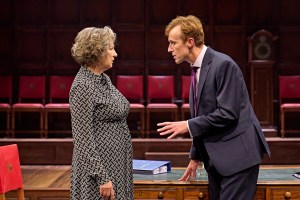The Other Boleyn Girl review – a new reign begins in Chichester Festival Theatre
Mike Poulton’s stage adaptation of the popular Philippa Gregory novel runs until 11 May

This new adaptation of Philippa Gregory’s colourful novel marks the opening production of, not just Chichester’s Festival season, but also of the new reign of Justin Audibert at the helm of the West Sussex venue. It’s a robust start and is one that will undoubtedly prove to be a crowd-pleaser for the ever-loyal Chichester audience.
Gregory’s works of historical fiction have proven to be massively popular, and whilst historical accuracy may only have a fleeting relationship with the final works, the fascination with those randy Tudors and their political, religious, and sexual adventures seemingly remains undiminished. The hordes of teenagers clambering to see Six the Musical, about the six wives of Henry VIII, are testament to that.
Mike Poulton has adapted the novel for the stage, and it is a fascinatingly unfamiliar story compared to those we all know from school. The Boleyn family is ambitious, ruthless, and determined to insert their blood into the royal line. But before there was Anne, there was Mary Boleyn. Forced to “bed the King” by her own parents, she would later go on to shun the court of King Henry and long for a quieter life as a farmer’s wife.
The story is also about abuse. The Boleyn children – brother, George (a personable James Corrigan) is being controlled whilst suppressing his own sexuality – are manipulated and used as pawns in the power games that are brokered by their mother (a steely yet unmenacing Alex Kingston) and their uncle, Thomas Howard Earl of Norfolk (a deliberate and full-voiced Andrew Woodall). The Boleyn girls decry the fact that “the family breed us like hunting stock” whilst their own mother regretfully rues “the strange creatures that I have bred” when they begin to defy her orders. Kemi-Bo Jacobs is particularly captivating as Queen Katherine, stately and dignified as her downfall is constructed by the shadowy figures of court.

Central to Lucy Bailey’s production are two brilliantly executed performances by Lucy Phelps as Mary and Freya Mavor as Anne. Phelps provides a measured approach to Mary as she adheres to her perceived sense of duty to act as the King’s mistress, before seeing through the horrific family politicking and making her escape. Mavor is dazzling to watch as the feisty and passionate Anne. Her own ambitions drive her to the King as her desires for power lead her to “put a ring through his nose and noose around his neck”. She treats him mean to keep him keen, but that doesn’t last for long as she is beset by miscarriages, unflinchingly portrayed here, before her untimely demise.
Poulton’s episodic structure loses some nimbleness in Bailey’s otherwise solidly directed piece. Less clear are Joanna Parker’s metal-clad stage designs that set the action on a sunken stage with a weirdly omnipresent picture of Henry on the floor – metallic and monochrome, it somehow jars with the deliciously lavish costuming that very much remains of the period. Orlando Gough’s music is played live but oddly mixes the sounds of the period – lutes and mandolins aplenty – with electric guitar riffs. A repeated whirring sound clicks and tracks its way from one side of the auditorium to the other, presumably to suggest the mechanical machinations of court, whilst odd contemporary projections are also thrown into the mix to blur the concept even further.
Whilst the pace occasionally drops during the nearly three hours running time, Poulton mostly keeps us interested. She leans heavily into the rumours of incest and avoids over-romanticism. It makes for a full-bodied and really enjoyable evening and will do nothing to reduce the fascination that we still have with the Tudors.
















